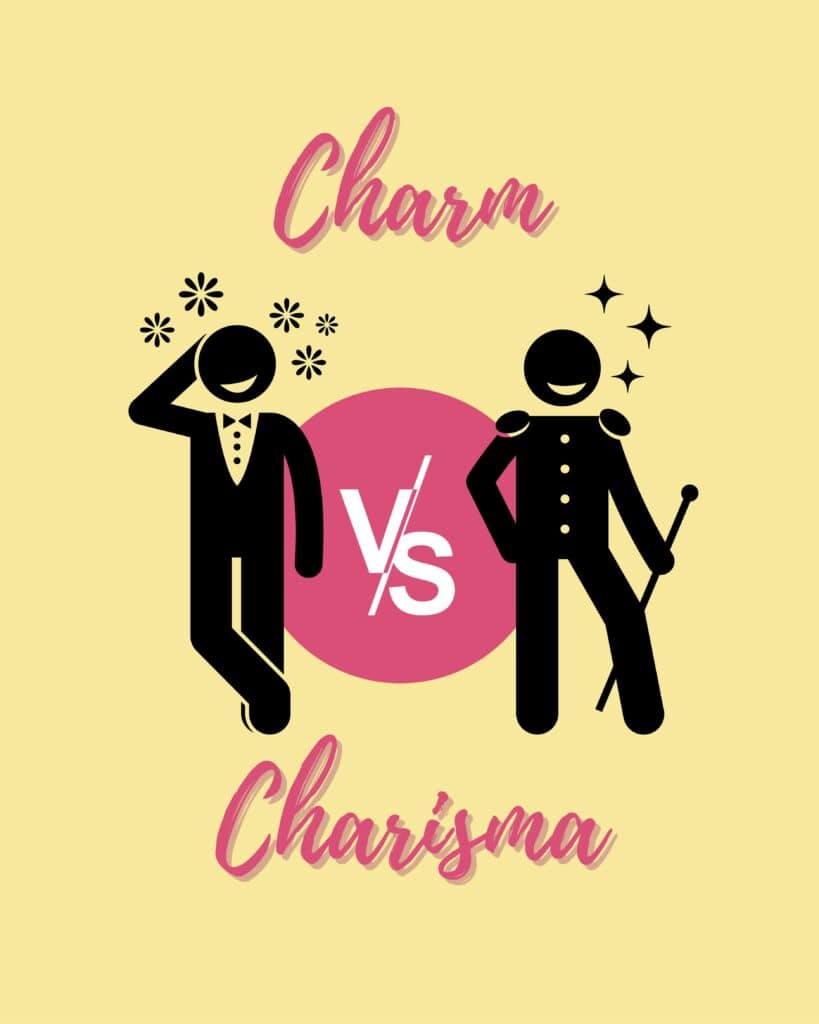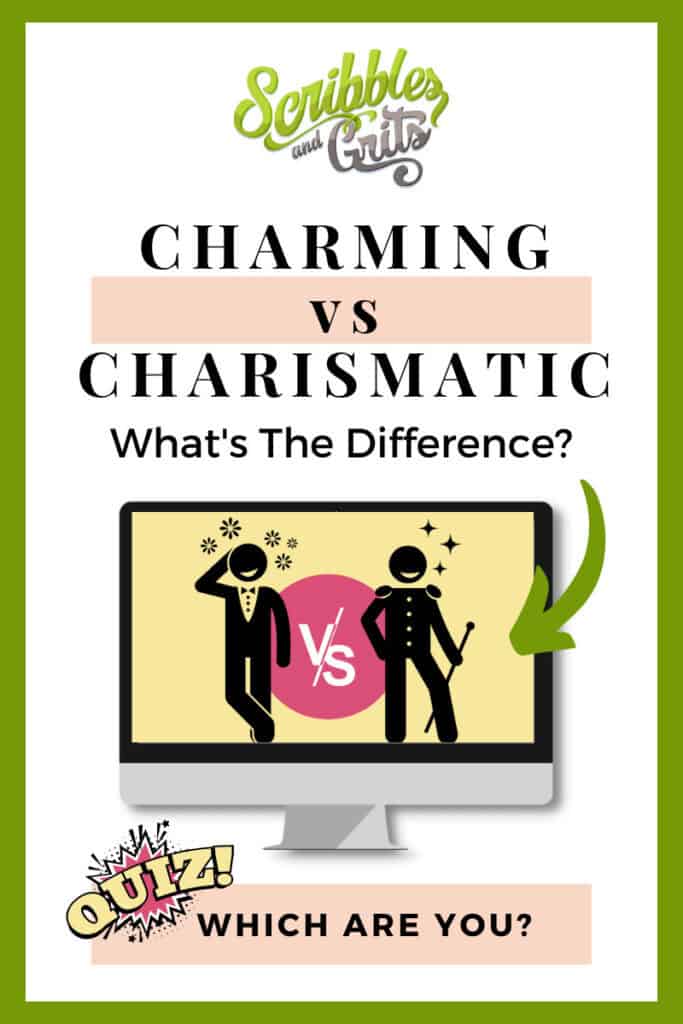Charm vs. Charisma: What Is The Difference? (Video)
Are you the life of the party or the master of one-on-one connections?
These two qualities make all the difference in the fascinating world of charm vs. charisma. Both have their unique allure, but they play distinct roles in how we interact with others.
What is the Difference Between Charm and Charisma?
The difference between charm and charisma lies in their scale and intent. Charm focuses on attracting and pleasing individuals personally, while charisma captures and engages entire crowds, leaving a lasting impact.
| Charm | Charisma |
|---|---|
| Personal level influence | Large scale influence |
| Creates likability & appeal | Radiates energy & magnetism |
| Focused on pleasing others | Focused on capturing the attention |
| Often a single character trait | Combination of traits |
| It can be turned on and off | Long-lasting & pervasive |
| Suitable for one-on-one relationships | Suitable for crowds |
Dive into the captivating realm of charm, the skill that makes people feel comfortable and appreciated, and charisma, the magnetic presence that lights up the stage.

Charm vs. Charisma: Charisma Meaning
Charm is the delightful ability to attract, please, or influence others through personality, appearance, or behavior, often creating a sense of likability and appeal. Charming individuals have that magnetic pull that draws people in, making them feel comfortable and valued. In addition, they are kind, likable, and easy to talk to, often adding a dash of humor or wit to spice up the conversation.

People blessed with charm have a natural knack for making others feel good, which can be valuable in building relationships and achieving success in various aspects of life.
These enchanting qualities often stem from a genuine desire to make others happy, be well-liked, and form positive or meaningful connections.
However, charm can also be used in calculated or strategic ways, particularly in professional settings.
It can be a significant advantage when forming relationships with new clients or employees, making it a popular skill to develop for those working closely with others, such as in human resources departments or customer relations.
Charm can be described as a single character trait that can be switched on and off or developed through socializing and practice.
Charming people tailor their behaviors, words, and actions to suit the individuals they interact with. By studying likes, dislikes, personalities, and behaviors, they learn how to charm different people in various contexts.
Charm can be linked to specific talents or skills that allow people to connect with others personally and engagingly. Here are some examples of talents or abilities that can contribute to a person’s charm:
- Active listening: A person who is genuinely interested in what others have to say and attentively listens to their stories or concerns can be considered charming, as they make people feel valued and heard.
- Empathy: A person who can understand and share the feelings of others is often seen as charming, as they create a deep emotional connection with those around them.
- Artistic expression: Someone who can captivate others through their paintings, photography, or other visual arts might be considered charming, as their art evokes emotions and creates a sense of wonder and connection.
- Sense of humor: A person who can make others laugh through wit or cleverness can be seen as charming, as laughter brings people closer together and helps create positive memories.
- Language skills: A person who knows and can use several languages (a polyglot) can engage with people from different cultures and backgrounds. Their language skills can be charming, as their linguistic abilities allow them to connect with others more personally and personally meaningfully.
These skills or talents contribute to a person’s overall charm, as they help foster positive relationships and make others feel good.
Charm vs. Charisma: Charisma Meaning
Charisma is the compelling ability to capture, attract, enthuse, and engage groups of people on a larger scale. Charismatic individuals have that natural allure that shines through a confident, bold, passionate, or tranquil personality, creating an atmosphere that radiates throughout the room. They can make crowds fall head over heels for them by being themselves.

While charisma can be learned over time, it’s much more challenging to develop than charm.
Since charisma involves a combination of traits and unique personality characteristics, it often defines an entire personality type. It’s a powerful representation of a character that can capture crowds by creating an intense and magnetic atmosphere.
People in authority roles or positions that involve public speaking, management, or influential tasks greatly benefit from charismatic qualities, as overflowing with energy and drive is often one of the most powerful traits.
Although impactful and memorable, charisma doesn’t always aim to make others happy – instead, it seeks to leave a long-lasting influence.
It’s a ‘forever’ trait, involving interactions on a broad scale with countless people daily.
Naturally, charming or charismatic people tend to lack other qualities most of the time. As a result, it’s common to find charming people who are popular in numerous circles but are seen as ‘pushovers.’ In contrast, many charismatic people are respected but perceived as ‘bossy’ or ‘domineering.’
In some cases, charismatic people can be charming, as enthusing large groups can be aided by a certain level of finesse and personable approaches. However, it’s less common to find a naturally charming person who’s also charismatic, as the motives of charm often clash with the intentions.
WITTYCOMPANION.COM
Charm intends to be likeable and enjoyable
Charisma is intense and magnetic
Take the Charm vs. Charisma Quiz
Now, let’s have some fun and find out if you possess “the charm of a captivating conversationalist” or “the charisma of a crowd-pleasing superstar”!
My Final Thoughts
Both charm and charisma hold their unique appeal and can be incredibly valuable in different situations.
While charm focuses on building personal connections and creating a sense of comfort and likability, charisma captivates and engages larger audiences, leaving a lasting impact.
Ultimately, the choice between charm and charisma depends on the context and the individual's natural personality. However, for those fortunate enough to possess both qualities, the world becomes their oyster, offering endless possibilities for success and meaningful connections.
So, whether you're a charming social butterfly or a charismatic leader, embrace your social superpower and make the most of every interaction!
Scribble Of The Day: Charm & Charisma Quote

Have you ever encountered someone who effortlessly blends charm and charisma? How did this person impact you or those around them? Tell us about your experience in the comments below!








